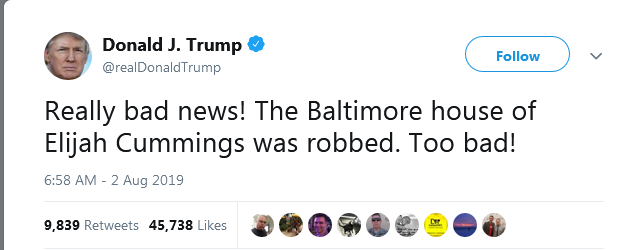Here are a some comments on how racism has prevailed in politics and for whom the political dialogues can most be effective. History repeats itself, but giving legitimacy to one leader’s POV is surmountable.
House Republican leadership aides expect few of their members to defect from Trump to support the resolution of disapproval, which could come up for a vote as soon as today. It also says that Trump’s tweets “have legitimized and increased fear and hatred of new Americans and people of color.”
Trump’s targets held a news conference at the Capitol last night to respond to the president’s comments. Reps. Ayanna Pressley (Mass.), Rashida Tlaib (Mich.), Alexandria Ocasio-Cortez (N.Y.) and Ilhan Omar (Minn.) each took turns speaking. Pressley was born in Cincinnati, Tlaib was born in Detroit, and Ocasio-Cortez was born in New York. Omar was born in Mogadishu, Somalia; her family fled the country amid civil war when she was a child, and she became a U.S. citizen as a teenager.
Ocasio-Cortez, who is of Puerto Rican descent, remembered when she was a girl and her dad brought her to the Reflecting Pool on the Mall. He told her to look around. Then he told her that the monuments she saw, and the nation they represented, belonged to her just as much as anyone else. “I want to tell children across this country,” the congresswoman said last night, “no matter what the president says, this country belongs to you, and it belongs to everyone.”
‘Don’t take the bait’: ‘The squad’s’ full speech responding to Trump’s tweets
Here are eight takeaways from this firestorm:
1) Trump’s rhetoric is creating a more dangerous climate and corroding the public discourse.
House Homeland Security Committee Chairman Bennie Thompson (D-Miss.) asked the Capitol Police last night to provide extra protection for the four lawmakers, citing a growing threat profile, per Fox News.
There are also longer-term impacts to consider. For better or worse, the president is a role model. Modeling bad behavior sends signals to young people just as much as good behavior.
Conservative columnist George Will argues that this is why Trump is worse than Richard Nixon. “I believe that what this president has done to our culture, to our civic discourse, you cannot unring these bells and you cannot unsay what he has said, and you cannot change that he has now in a very short time made it seem normal for schoolboy taunts and obvious lies to be spun out in a constant stream,” the consistent Trump critic said on a New York Times Book Review podcast last week. “This will do more lasting damage than Richard Nixon’s surreptitious burglaries did."
2) Trump’s “go back” rhetoric is consistent not only with his own long history of attacks on people he perceives as the other but also the nation’s oscillating attitudes toward immigration throughout its history. Marc Fisher traces the etymology: “The Know-Nothings wanted German and Irish immigrants to get out because they were allegedly subversive and diseased people who were stealing American jobs. White preachers and politicians of the 1820s urged freed blacks to move to West Africa, supposedly for their own good. From that drive to encourage blacks to go back where they came from to waves of nativist attacks on Catholics, Jews, Asians and Hispanics in nearly every generation that followed, ‘go home’ rhetoric is as American as immigration itself. …
“ There is hardly any ethnic or racial group in the country that hasn’t been told to go back where they came from. In collections of voices from the Japanese American internment camps of the World War II era, in diaries of the earliest Italian and Irish immigrants, in Jewish novels and memoirs from the turn of the 20th century, the slur is a mainstay. … From Calvin Coolidge’s warnings in the 1920s that the country was becoming ‘a dumping ground’ and that ‘America must remain American’ to the ‘America: Love it or leave it’ rhetoric that surrounded Richard Nixon’s presidency, the nation’s leaders have struggled for two centuries with a central ambivalence about its core identity as a magnet for immigrants.”
– The news media is grappling with how to label Trump’s Sunday tweets, but The Washington Post decided Monday afternoon to use the word racist because of the well-documented history. “The ‘go back’ trope is deeply rooted in the history of racism in the United States. Therefore, we have concluded that ‘racist’ is the proper term to apply to the language he used Sunday,” Post Executive Editor Martin Baron said in a statement.
– Conservative lawyer George Conway, the husband of counselor to the president Kellyanne Conway, explains in an op-ed for The Post why this episode caused him to conclude that Trump is a racist – after years of giving him the benefit of the doubt.
3) White identity politics is driving Trump as 2020 approaches, and the Republican Party that he’s remaking in his image. Trump is making clear that his reelection campaign will feature the same explosive mix of white grievance and anti-immigrant nativism that helped elect him, Michael Scherer explains: “Trump’s combustible formula of white identity politics has already reshaped the Republican Party, sidelining, silencing or converting nearly anyone who dares to challenge the racial insensitivity of his utterances. It also has pushed Democratic presidential candidates sharply to the left on issues such as immigration and civil rights, as they respond to the liberal backlash against him. Left unknown is whether the president is now on the verge of more permanently reshaping the nation’s political balance — at least until long-term demographic changes take hold to make nonwhite residents a majority of the country around 2050. …
“ Ashley Jardina, a professor at Duke University who recently wrote a book called ‘White Identity Politics,’ said that a majority of white Americans express some racial resentment in election-year surveys. Between 30 and 40 percent embrace a white racial identity. It is the latter group, with concerns about growing immigration threatening their racial status, who gravitated strongly to the president. The feeling of white identity is much stronger among non-college-educated whites than those who went to college, she said. ‘We do know that it is politically mobilizing,’ Jardina added. ‘Those who feel racial solidarity have more likelihood to participate in politics.’ …
“ A December 2018 Pew Research Center poll found that 46 percent of white Americans said having a majority nonwhite nation in 2050 would ‘weaken American customs and values.’ … Asked whether having a majority nonwhite population would strengthen American customs and values, 42 percent of Democrats said it would, while only 13 percent of Republicans agreed.”
“ Trump is proposing a giant swap: Republicans can no longer count on suburban women and we will continue to lose college-educated men and women, while we increasingly pick up working white Americans without college degrees,” said Ari Fleischer, who was a White House press secretary for President George W. Bush and who has spoken with Trump campaign advisers about their strategy for increasing turnout. “Nobody knows who will come out ahead in the swap,” he told Scherer. “That’s what the campaign will tell us.”
President Trump walks out of the White House on Monday. (Jabin Botsford/The Washington Post)
4) Trump’s increasingly incendiary rhetoric is being met with fading resistance from Republican and corporate leaders.
Making the case that the president’s behavior is being normalized, Toluse Olorunnipa compares the applause Trump got at the White House on Monday to what happened after Trump said Mexican immigrants are rapists, called for a Muslim ban and insisted there were good people on both sides in Charlottesville. “The president, who has grown more comfortable in Washington as he has surrounded himself with assenting voices, has learned over the past three years that there is little consequence within his party or from aligned corporate and religious leaders for embracing incendiary rhetoric and pugilistic attacks,” Toluse writes:
“ The business world largely shrugged off Trump’s words, a shift from the kind of forceful response that industry leaders provided after Charlottesville. After Monday’s event at the White House — during which Trump accused members of Congress of hating Jews and loving al-Qaeda — business leaders gathered for the event circled around the president as he signed an executive order. Standing with Trump was Lockheed Martin chief executive Marillyn Hewson, one of the business leaders on Trump’s manufacturing council before it disbanded after the Charlottesville violence. Lockheed spokesman Bill Phelps did not answer questions about whether Hewson approved of Trump’s comments before or during the event.”
– The New York Times looks at how senior staffers at the White House have grown emboldened as Trump blusters his way through scandals. After Trump defended the neo-Nazi protesters in Charlottesville, Gary Cohn, his top economic adviser at the time, told the Financial Times that “this administration can and must do better in consistently and unequivocally condemning these groups,”” Annie Karni notes. “On Monday, Mr. Cohn’s successor in the West Wing, Larry Kudlow, steered clear of the latest flare-up of Mr. Trump’s inflammatory language. ‘That’s way out of my lane,’ Mr. Kudlow said when asked about the president’s weekend tweets. ‘He’s tweeted what he’s tweeted,’ Mr. Kudlow said. ‘You’ll have to talk to him about that.’
“ After Charlottesville, Ivanka Trump, the president’s daughter and a White House adviser, issued her own statement on Twitter, saying there was ‘no place in society for racism, white supremacy and neo-nazis.’ It was a notable corrective to her father. On Monday, Ms. Trump declined to comment on her father’s latest remarks. … Administration veterans said they had long ago become immune to thinking anything Mr. Trump said would stick to him for more than one news cycle. Indeed, even a year after Charlottesville, Republican lawmakers who distanced themselves from the president had come back to embrace his tax overhaul and his selection of Brett M. Kavanaugh for the Supreme Court.”
– “Melania Trump is only the second first lady of the United States not born in America; the first, Louisa Adams was born in England. Yet she’s remained silent as her husband tweets racist and xenophobic attacks,” CNN notes .
– Speaking of Charlottesville: Two weeks after being sentenced to life in prison by a federal judge, the avowed neo-Nazi James A. Fields Jr. received a similar sentence in a Virginia court on Monday for ramming his car into counterprotesters during the white-supremacist rally. In ordering terms of life plus 419 years in state prison, Charlottesville Circuit Court Judge Richard Moore imposed the punishment recommended in December by a jury that convicted Fields of first-degree murder and nine other charges, per Laurel Demkovich and Paul Duggan.

Small but united: Understanding the four-Congresswoman ‘squad’
5) Trump wants to make “the Squad,” as the four women he attacked call themselves, the face of the Democratic Party.
The president suggested that he’s attacking these women to elevate them. “The Dems were trying to distance themselves from the four ‘progressives,’ but now they are forced to embrace them,” he wrote after their presser last night. “That means they are endorsing Socialism, hate of Israel and the USA! Not good for the Democrats!”
A Trump campaign adviser told Jackie Alemany for her Power Up newsletter that Trump’s tweets “yet again reinforced in the minds of many Americans that the Democratic Party is the party of AOC and Omar.”
– But even if there’s some strategy, that doesn’t necessarily mean it’s a good one. Trump has united Democrats after they spent a week in disarray. “Inside the White House, there was some frustration that the president had inserted himself into what was an internal Democratic feud, offering Nancy Pelosi a convenient off-ramp from her disagreements — generational, philosophical and tactical — with the four liberal lawmakers,” Ashley Parker, Rachael Bade and John Wagner report.
Dana Milbank notes that Trump’s latest comments made Democratic bickering over Joe Biden’s relationship with James Eastland in 1973 look small in comparison, a dynamic that could help the former vice president.
– Looking forward, this gives some momentum to liberals who want impeachment. There is lots of speculation that Trump welcomes impeachment proceedings because he knows Senate Republicans are not going to remove him from office, and he has said his base would rally behind him if Democrats impeach.
Despite the speaker’s opposition, 85 Democrats have publicly called for starting impeachment proceedings against Trump, more than one-third of her caucus. All four of the lawmakers in question have already called for Trump’s impeachment. Omar mentioned impeachment during the news conference. “It’s time for us to impeach this president,” Omar said. “It is time for us to stop allowing him to make a mockery out of this Constitution.”
Rep. Al Green (D-Tex.) said he plans to force a vote on the House floor this month on impeaching Trump. The House voted 364 to 58 in December 2017, with Republicans in the majority, on a motion to table Green’s previous impeachment resolution. Green said Monday that “the American people are fed up” with his racism and bigotry and that the Sunday tweets brought everything “to a boiling point.”

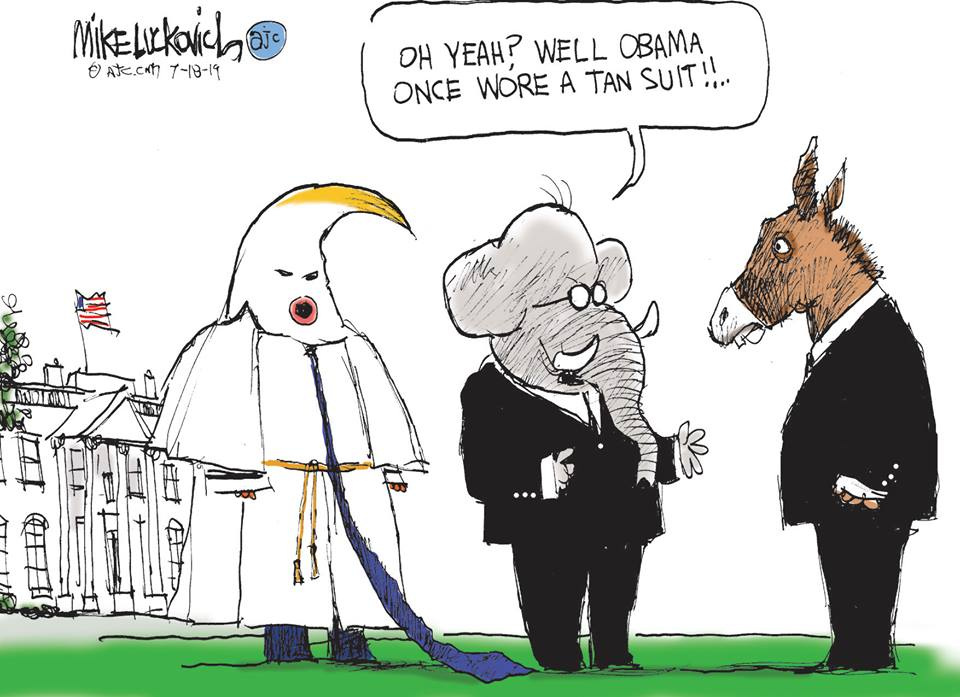
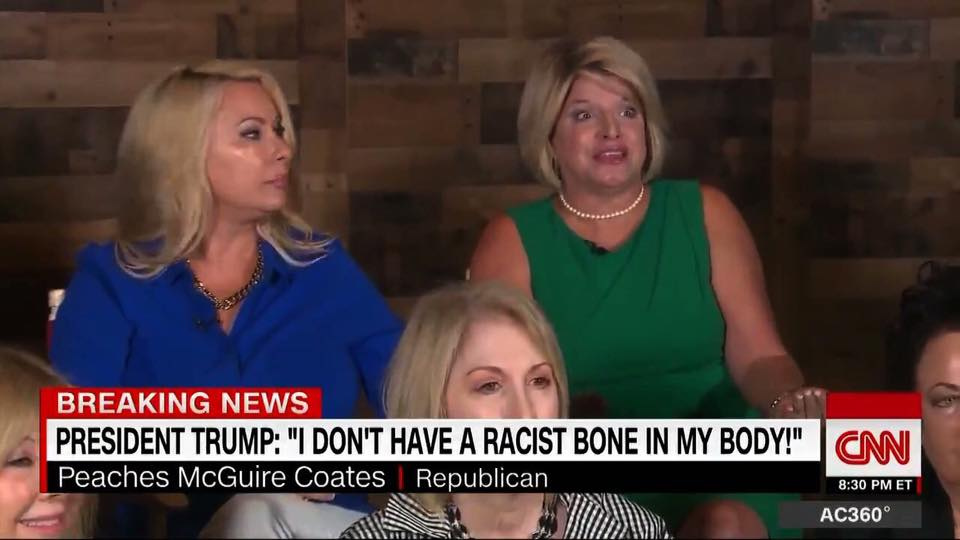

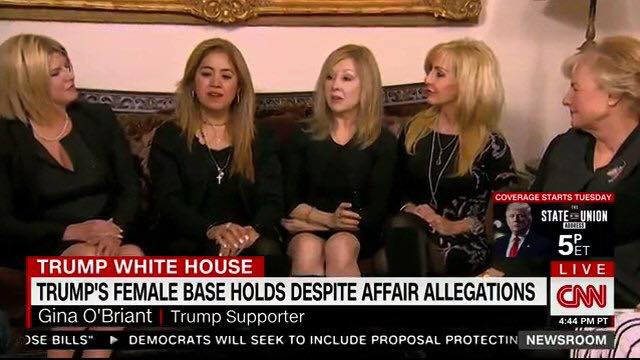
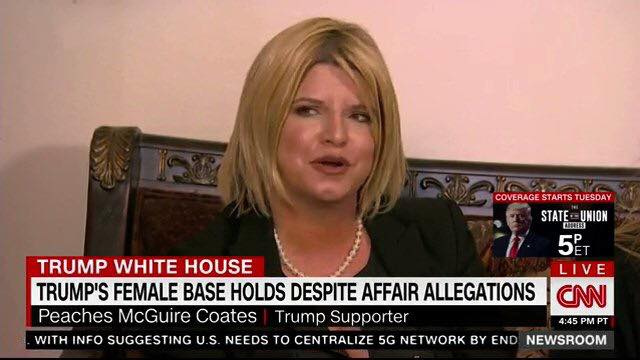


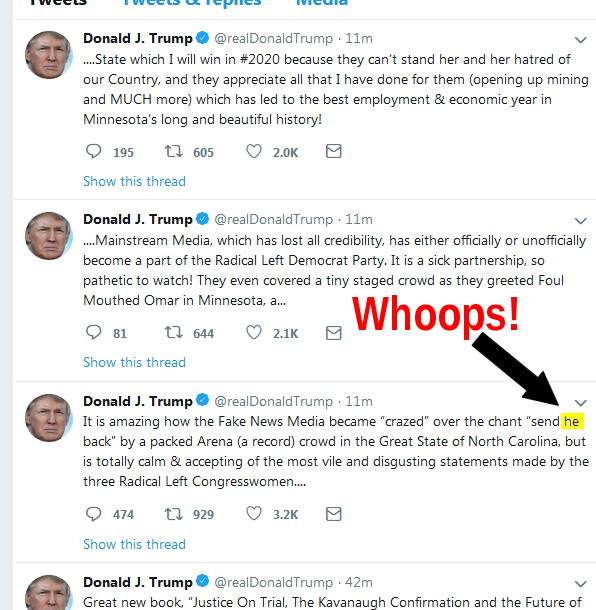







 Podcast
Podcast